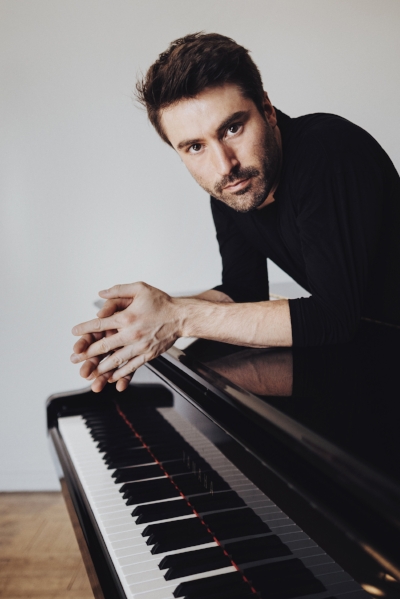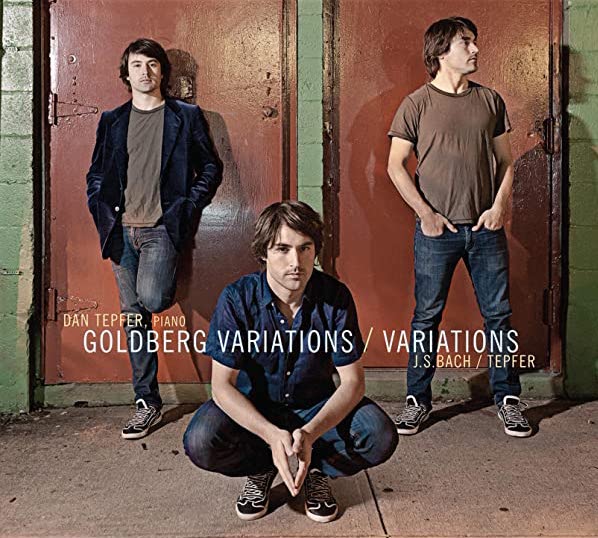by Jarrett Hoffman

That disc brought Tepfer global acclaim, and the project remains one of his most requested from presenters worldwide. So it should come as no surprise that it’s the main feature of his free, virtual concert on the Tri-C Classical Piano Series this Sunday, April 18 at 2:00 pm. (Click here at start time.) In addition to excerpts from the Bach, and of course the corresponding improvisations, the program also includes three of his original compositions.
I reached the New York City-based musician by email, and we began by discussing a blog post of his that delves into his journey with the Goldberg Variations.
Jarrett Hoffman: You write about how, in order for your improvisations to stand up next to the variations, they needed to be “concise and focused; they needed to get to the point, all while remaining personal.” Is it difficult to balance spontaneity with getting to the point?
Dan Tepfer: Yes, this is one of the most interesting challenges of this project. To remain authentically spontaneous and let things go where they want to go in the moment, all while staying conscious of the overall frame so that we don’t get lost in the weeds.
The Goldbergs weren’t named “Goldberg Variations” when they were published, in fact — the name is apocryphal. They were published as “Clavier Übung,” which means keyboard study. Over time, I’ve come to think of my improvisations as improvisation studies. I have clear ideas about what each one is about — what the parameters are — but I fight hard to maintain my freedom within them. That’s the game. To see how free I can be within the cage that each one offers.
JH: In that same blog post, you describe being out on tour in 2008 playing a series of freely improvised gigs, and beginning to run out of ideas. It was then that you first turned to the Goldbergs as improvisational inspiration, with each variation serving as “a jumping-off point.” It’s interesting to me that this project came from a place of necessity, a situation in which you needed a spark. Would you say the same of anything else that has happened in your life or career?
DT: Most things, or at least the good things, that I’ve come up with have come from a place of necessity. My happy place is being painted into a corner and seeing if I can find my way out. This applies to my own music, where I often try to make things hard for myself, in the belief that when we do challenging things, our ego simply doesn’t have the energy to interfere and we find our truest, most fundamentally aware selves.
It also applies to life’s challenges. The pandemic, for example, as hard as it’s been, has in the end been a source of creativity for me. I’d never even thought of giving livestream concerts before, but over the last year, with the necessity of finding a way to stay active as an artist, I’ve done close to a hundred, and the community of listeners I’ve developed as a result has been a wonderful surprise.
The necessity of the pandemic also led me to dive deep into an obscure piece of academic software called Jacktrip that allows you to play music with others over the internet, provided they’re not too far away, and to get it working well enough to give ticketed concerts using it. I’d say that I love challenges so much that I feel a little lost without them.
JH: Your talents extend to writing — your articles are very clear and very in-depth. How did you start that practice, and what keeps you coming back to it?
DT: Thanks for saying so! I’ve always enjoyed writing, and I did it for years privately before deciding to start a blog. Mainly, it’s a way for me to clarify thoughts and ideas for myself. If I have an epiphany, I know that I might forget it in a few years, and it helps to write it down. And sharing these thoughts publicly pushes me to clarify my ideas even more.
JH: Goldberg Variations / Variations came out in 2011, already ten years ago. Has your approach to this piece and to the improvisations changed in that time?
DT: When I made this album, I thought of it as a piece of conceptual art, a product of a long time spent in the studio, something I’d only present to the world as a recording. I never thought I’d still be performing it ten years later.
But, in fact, it’s never once felt boring to me, because on the one hand, the Goldbergs themselves are an utterly inexhaustible masterpiece, a work that you can play and grow with throughout your entire life. Every time I perform them, it’s an opportunity for me to deepen my relationship to them. And on the other hand, since I’m improvising half of the music every time I perform, that part of it is exactly as fresh as I make it. It’s up to me.
So, to answer your question, my approach has absolutely changed over the last ten years. My understanding of Bach’s music has deepened enormously, and I’ve also matured as an improviser, so it keeps evolving and growing. I feel lucky to have a project like this that continues to inspire me after so many years.
JH: Is there another piece or another composer that you would consider giving a similar treatment?
DT: The closest I’ve come is my new project Inventions / Reinventions, where I play Bach’s beloved Inventions, and for the missing keys (he wrote 15 Inventions in different keys, but there are 24 available major and minor keys), I improvise inventions of my own. I hope to record this project soon. It’s an idea that took a long time to mature.
In the Goldberg project I’m responding directly to each of Bach’s variations, taking themes and ideas from him and responding to them in my own language. In the Inventions project it’s very different: I’m not responding to any specific material of Bach’s, but instead, improvising my own inventions from scratch, coming up with ideas and structure in the moment. It’s vertiginously freeing. The connection with Bach is that I’m operating, in my own way, within the same system of tonal harmony and thematic continuity that Bach used, which it’s taken me many years to get comfortable with.
JH: Will your Tri-C concert be live or pre-recorded?
DT: This is a recital I gave in October 2020 in Cleveland. I should add that in this recital, due to time constraints, I play a special subset of the Goldbergs, not all of them. I chose to play only the canons. The Goldbergs are structured in groups of three, with every third variation a canon at a different interval. They’re in many ways the most musically challenging of the variations to play and to respond to, and I think it works beautifully to play only them — there’s an inner logic to the sequence. After the Goldberg canons, I play three compositions of my own, from my last trio record: Hindi Hex, Minor Fall, and Roadrunner.
Published on ClevelandClassical.com April 14, 2021.
Click here for a printable copy of this article




